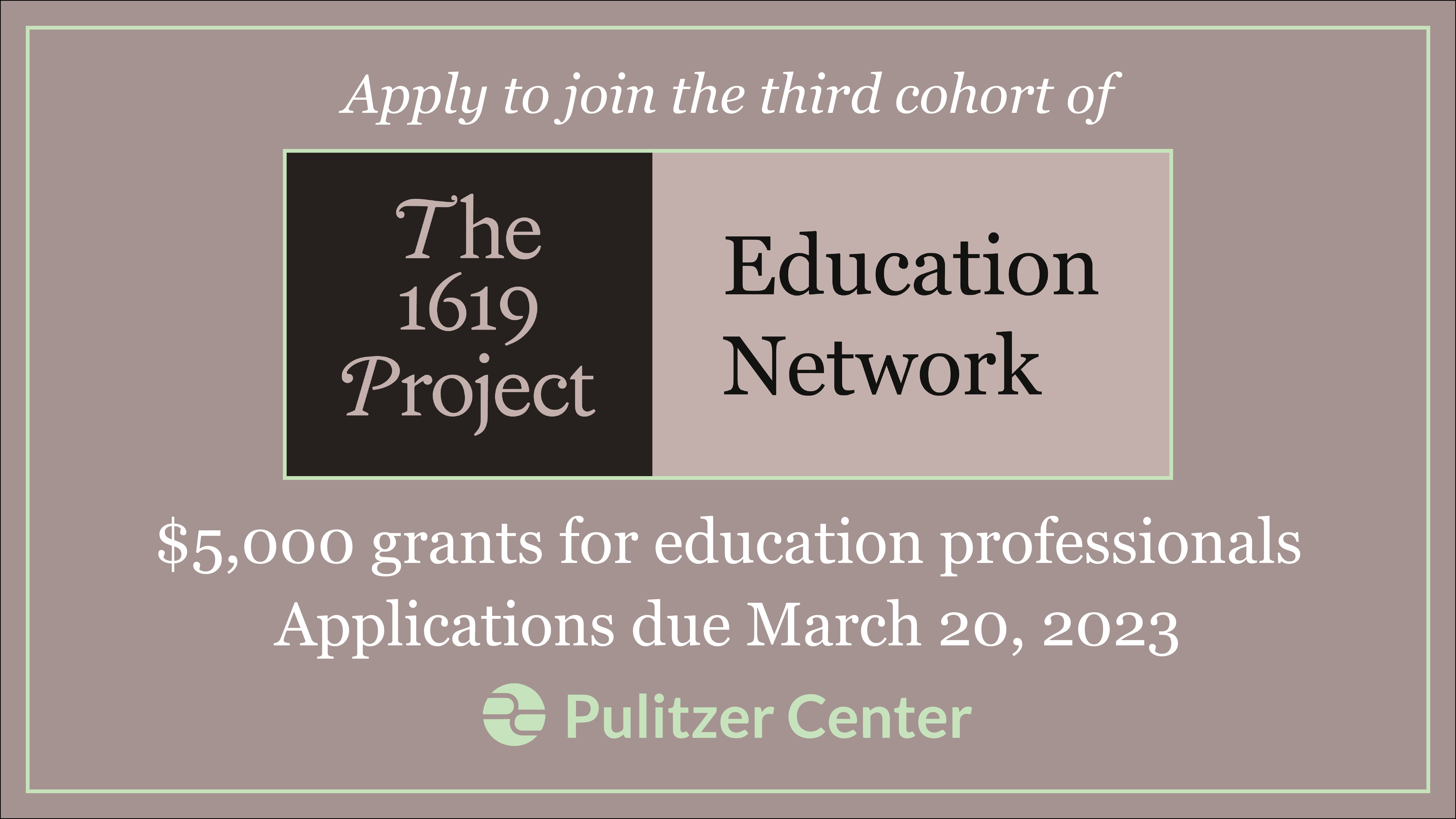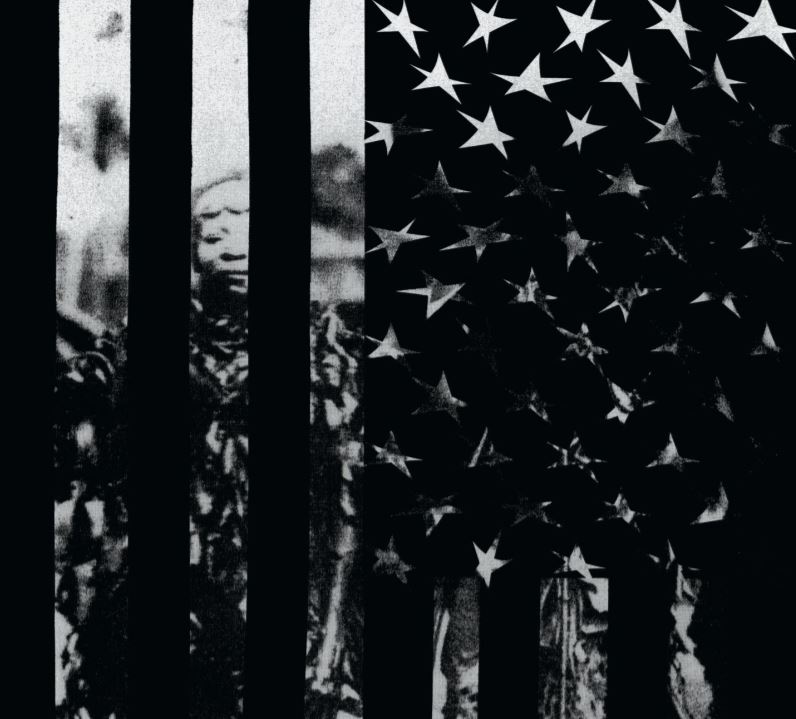
How can exploration of the essays, creative writing, photography, podcasts, and books that make up The 1619 Project from The New York Times Magazine, support existing curricula, while also helping students evaluate historical research and process current events? How can authentic engagement with media literacy skills and underreported news stories on racial justice help students engage curiously, critically, and empathetically with the world?
Over the past two years, The 1619 Project Education Network program has engaged 80 teams of educators and administrators working with K-12 classrooms and education programs for carceral facilities in an exploration of these questions over the course of a school year. The teams connected as part of Network convenings, reading groups, and collaborative planning sessions. They developed and taught standards-aligned unit plans that explored how the content and themes from 1619 support their diverse curricula, and then shared their work through digital events and resources. We are so pleased to invite your team to join this year’s Network program, and we are also excited to share some new program developments!
This year, for the first time, we are eager to welcome applicants from schools of education at colleges and universities in the U.S. Applications focused on curriculum and training within your school of education OR in partnership with K-12 teachers in your community will both be welcomed. Applications continue to be open to teams of education professionals working in K-12 schools and education programs in carceral facilities.
We are also inviting more flexibility and creativity in what teams plan and produce. We hope this will lead to some exciting applications that will engage large audiences that could include both students and other community members.
Program Description:
As part of this paid, virtual program, a cohort of teams made up of administrators and educators will receive grants of $5,000 each to support exploration of key questions of racial justice and other pressing systemic issues in community with award-winning journalists and the Pulitzer Center education team.
Over the course of 2023, Network teams will …
- Develop curricular projects that engage students in The 1619 Project, and other journalism and historical sources, to strengthen connections to existing curricula, practice media literacy skills, and build empathy. (Projects can include unit plans for individual courses, school or community projects that engage multiple grades/courses, work with pre-service teachers, etc. If you have questions about your proposed project, reach out to [email protected])
- Manage the implementation and evaluation of the projects by engaging a team of at least two educators and/or administrators in order to expand the reach of the project.
- Share their unit/project plans, teaching/planning materials, evaluation materials, and student work publicly through the Pulitzer Center’s online lesson library and virtual professional development programs.
- Devise plans for revising and expanding use of their units/projects in 2024.
- Actively participate in quarterly Network meetings, required program planning sessions with Pulitzer Center staff, and other optional gatherings, to share progress, gain professional development, evaluate lessons learned, and provide support and feedback for other members.
Cohort participants will receive…
- A $5,000 grant to support curriculum and/or project development, implementation, and other costs ($2,500 upon submission of project draft(s) and $2,500 upon receipt and approval of final grant deliverables outlined below)
- Access to professional development workshops led by journalists, scholars, and Center staff
- Access to a virtual portal that shares curricula, showcases student work, and provides avenues for participants to network and collaborate.
Timeline and Requirements:
The 1619 Project Education Network will begin with a virtual orientation on Saturday, May 13, 2023, from 11:30am-3:45pm EST. The program will conclude in February 2024 with a conference hosted by the Pulitzer Center, which will celebrate members’ work and analyze ways that members can build on their work in 2025.
Members are required to join three additional Saturday sessions in 2023 for professional development and networking. Each four-hour session will include seminars with award-winning journalists and opportunities for peer feedback. All sessions will be held live via Zoom.
By January 12, 2024, each team will have …
- Crafted and shared at least one curricular project that engages students and/or community members in The 1619 Project, and other journalism and historical sources, to strengthen connections to existing curricula, practice media literacy skills, and build empathy. (Due September 5, 2023)
- Implemented their curricular project with the support of at least two educators and/or administrators in order to expand the reach of the project (i.e. taught in multiple classes, engaged multiple courses, connected to community members through, etc.)
- Evaluated students' work and provided documentation of their project in the form of student work, lesson plans, teaching materials, evaluation materials, testimonials from participants, and/or images and video.
- Shared plans for revising and expanding use of their units in 2024.
Members’ work will be shared on the Pulitzer Center’s 1619 Education Portal, where they can be accessed for free by educators worldwide. Fellows may also have the opportunity to participate in teacher professional development webinars and/or conference presentations. Below are the key program dates and a timeline for unit design and implementation.
Key Dates:
- Saturday, May 13, 2023: Network orientation
- Between mid-May and mid-June: Teams meet with the K-12 Partnerships Manager to brainstorm and discuss questions/logistics
- June 2023: Network convening
- Friday, September 1, 2023: Unit(s) drafts due
- September 2023: Network convening
- December 2023: Network convening
- January 12, 2024: Revised unit draft(s), evidence of unit implementation, evidence of unit evaluation, and initial plans for unit expansion in 2022 due
- Between mid-January and mid-February: Teams meet with the K-12 Partnerships Manager to discuss their project status and plans for extending upon their work in 2024
- Saturday, February 17, 2024: Final Convening
- Saturday and Sunday, February 17-18, 2024: The third annual 1619 Education Conference
If you have additional questions, please contact us by emailing [email protected]. We look forward to hearing from you! Click here for a downloadable version of the program announcement and description.
The Pulitzer Center's national education work on The 1619 Project is a partnership with the journalists and editors behind this landmark New York Times Magazine initiative. We are grateful to the foundations and individuals who have joined this effort, with primary support from Meta. Other donors include Humanity United, the Trellis Fund, the Art for Justice Fund, Open Society Foundations, The Rockefeller Brothers Fund, and the Charles Stewart Mott Foundation.






